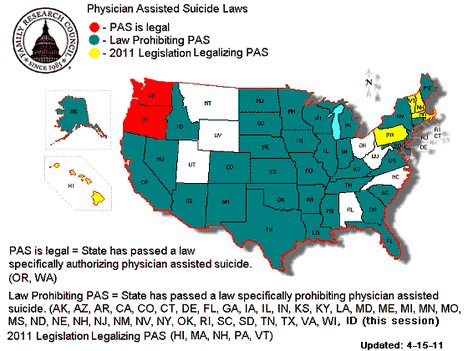|
by Matthew Lee '15  A map showing which US states have legalized/prohibited physician-assisted suicide. [image via] Imagine Emma Sue Schroeder, an 83-year-old terminal cancer patient who wants her doctor to prescribe lethal pills for her. Should that be legal? On April 2, Prof. Felicia Ackerman (PHIL) discussed the above scenario in a Science Café hosted by The Triple Helix called “The Double Standard in Physician-Assisted Suicide.” Ackerman is well-known as the writer of well over a hundred letters to the editor in The New York Times and as the writer of a column in The Providence Journal. Ackerman teaches PHIL0030 “Skepticism and Knowledge” and PHIL0880 “Ethical Themes in the Contemporary American Short Story.” Ackerman argued that, out of respect for Rachel’s autonomy, it should be legal for lethal pills to be prescribed to Rachel and contended that government should not deal in morality. Ackerman hit upon five main ideas:
In its most extreme form, the paradox goes as follows. Either the patient’s loved ones want him to die quickly in order to save money or otherwise make their lives easier, or they do not. If they do not, the patient does not respect them by dying for their sake. If they do, then why is the patient sacrificing what would otherwise be left of his life for people who love him so little that they value his life less than money and/or freedom from encumbrance? Wouldn’t a truly loving family find such a sacrifice appalling? … Decent and loving families, as part of their decency and lovingness, will recognize the latter desire as ignoble and, on balance, will not want patients to pander to it.
Ackerman then fielded questions from those in attendance. The questions covered a variety of important extensions and ideas, including:
Ackerman’s position, that doctors should be allowed to prescribe lethal pills to people like Rachel, is not mainstream. It runs counter to the generally accepted idea that death is the absolute worst thing that can happen to someone ever. The fascinating subject and its associated moral questions, combined with Ackerman’s wit and straight talk, made this discussion incredibly engaging, stimulating, and thought-provoking.
0 Comments
Leave a Reply. |

